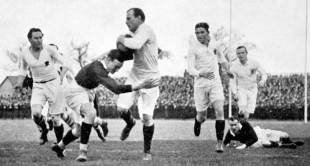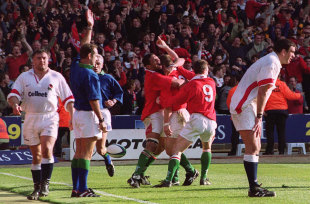|
Six Nations
Tying down that elusive Grand Slam
Huw Richards
March 12, 2013

England's Francis Oakeley tries to break away from his marker in 1913
© PA Photos
Enlarge
There is a sense of 'all or nothing' about England's task next Saturday in Cardiff. They can lose narrowly to Wales and still be Six Nations champions, but know the fate that is likely to await them if they do. Those who were playing in 2011 know at first hand. Like two other recent England teams, those of 2000 and 2001, they were Six Nations champions, but are better remembered instead for having lost a Grand Slam on the last day of the season. Fairly or not, a title is not enough if it is accompanied by the loss of a slam. England will be the 58th team to play for a Slam since Wales first achieved the feat in 1908. They will be the 19th England team, a century on from the first - the 1913 XV captained by Norman Wodehouse, cousin of humorist PG and including such immortals as outside-half W.J.A Davies, centre Ronald Poulton and Cherry Pillman, a pioneer of back-row play before it was fully defined as a specialism, which beat Scotland 3-0 with a try by Australian-born forward Bruno Brown. They might be the 59th or even 60th contenders had not the 1972 season been truncated by security fears when Wales had already won three matches and Ireland two from two, both away. Of their 57 predecessors, 37 have emerged with the slam. Nineteen fell at the last while the Irish team of 1951 is the only one subjected to the peculiar limbo accompanying a final day draw, 3-3, in Cardiff against a Welsh team for whom Clive Morgan was making his debut. The big variation is where they were played. Of the 28 who were playing at home, only four failed. Each in its own way was memorable. France's 16-11 defeat by a Wales team inspired by veteran skipper Rees Stephens in 1955 deprived it of a first ever title as well as a Slam. French revenge by 10-9 33 years later at Cardiff began the unravelling of the Welsh team that had finished third in the World Cup a year earlier. Scotland's 18-9 loss at home to England in 1996 started with the recalled Dean Richards claiming the ball for the visitors from the kick-off. It was hardly seen again in a match of nine penalty goals, six landed by Paul Grayson for England. Ireland's 42-6 defeat by England in 2003 is the heaviest defeat ever inflicted on a Slam contender at home or away, arguably represented the peak for a team which became World champions a few months later and is the only away win on six occasions when two teams have gone into the final round still cherishing Slam ambitions.
England will, of course, be playing away. Visitors, unsurprisingly, are a much less sure thing. The 29 have a success rate slightly under 50 per cent - 13 wins plus that 1951 draw by the Irish against 15 defeats. They include the first ever team denied a Slam at the last hurdle, the 1920 Scots who went down 13-4 at Twickenham. England are particularly aware of this disparity. They have played for seven slams at Twickenham, and won every time - most recently when they beat Scotland 24-12 in a Slam head to head in 1995. Five out of 11 away isn't too bad, but that includes three early successes - 1914, 1921 and 1923. Their record since 1954, when an 11-3 defeat made them the first ever aspirant Slammers thwarted by France, is two wins out of eight. Five of those near misses live acutely in the memory - losing to Scotland in 1990, the inverse Triple Crown of consecutive final day defeats by Wales, Scotland and Ireland between 1999 and 2001 and the crashing demise of Martin Johnson's team in Dublin two years ago. Add in the Dublin victory of 2003, and Saturday's match will be the sixth consecutive time that an England team seeking to seal a Slam has had to do it away from home.

Scott Gibbs is congratulated on his try against England in 1999
© Getty Images
Enlarge
They can at least feel grateful that they won't have to play the likeliest party-poopers. That would be difficult, since it is themselves. Starting with that thwarting of the Scots in 1920, England have denied four of the five opponents who have travelled to Twickenham in pursuit of a slam - France in the match which started with one of their greatest ever tries in 1991, Wales in 1994 and Scotland a year later. The 1981 French are the only visitors to have sealed a slam at Twickenham. Wales will be hosting Slam chasers for the seventh time, although only the fifth on Welsh soil, since the others were during their two-season exile at Wembley - with spectacularly contrasting outcomes. Welsh fans are about as keen to recall France's 51-0 win in Thomas Castaignede's finest hour and 20 minutes in 1998 as their English counterparts are to remember the Scott Gibbs try and Neil Jenkins conversion that left them 32-31 losers of a match they had dominated, and made Scotland the last Five Nations champions, a year later. The Welsh record as obstacle on home soil is similarly balanced. The 1926 Irish were defeated 11-8 at Swansea and the 1978 French undone by two Phil Bennett tries as they lost 16-7 in the first ever Slam head to head. Balancing the account are France's first ever Slam in 1968 and Ireland's triumph in 2009, along with that Irish draw in 1951. So what ever happens, Saturday represents a first. England have never had a chance to complete a Slam, nor Wales the opportunity to thwart them, on Welsh soil. There's also a fair chance there'll be a repeat before long. Slams are getting more common, perhaps explaining why teams who fall short but take other titles are no longer regarded quite so warmly. There were 10 in the 19 seasons between 1908 and 1931, with two more contenders falling at the last. Even this comparative frequency fell away after France was readmitted to the championship, making the feat possible once more, after the Second World War. The period between 1947 and 1975 saw the term coined, following England's victory in 1957, but comparatively flew Slams. There were six in 29 seasons, and only one - Eric Evans's 1957 team - between 1952 and 1968. It may or may not be coincidence that increased incidence followed the beginning of fixture rotation in the mid 1970s. The 24 seasons between 1976 and the end of the Five Nations saw 13 Slams and a further 10 teams falling at the last, five of them in final day head to heads. And there has been no let up since Five Nations became Six. There have been eight five-win slams in 13 seasons and four near misses, three by England. Over the last 20 seasons only 2006 and 2007 have passed without a team reaching the final round brandishing a 100 per cent record. © ESPN Sports Media Ltd.
| |||||||||||||||
Live Sports
Communication error please reload the page.
-
Football
-
Cricket
-
Rugby
-
- Days
- Hrs
- Mins
- Secs
F1 - Abu Dhabi GP
Abu Dhabi Grand Prix December 11-131. Max Verstappen ()
2. Valtteri Bottas (Mercedes)
3. Lewis Hamilton (Mercedes)
4. Alexander Albon ()
5. Lando Norris ()
6. Carlos Sainz Jr ()
-
ESPNOtherLive >>
Golf - Houston Open
Snooker - China Open
Tennis - Miami Open

